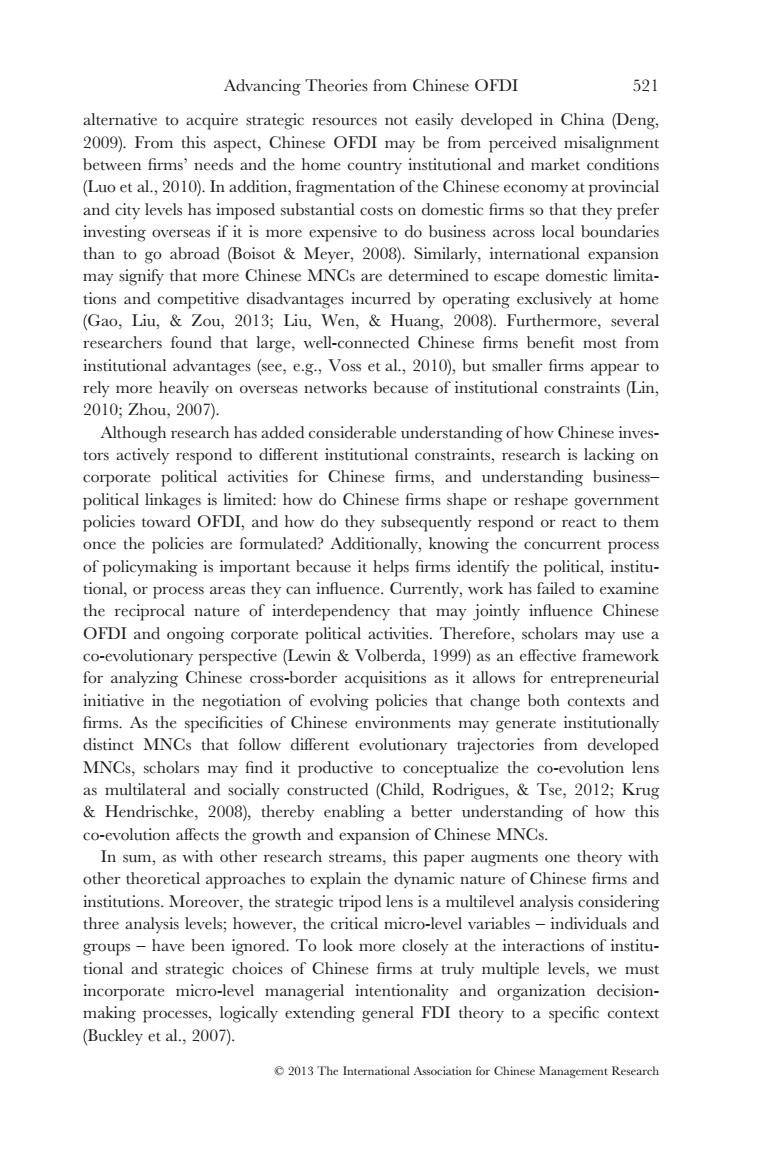正在加载图片...

Advancing Theories from Chinese OFDI 521 alternative to acquire strategic resources not easily developed in China (Deng, 2009).From this apect,Chinese OFDI may be from perceived misalignment between firms (Luo et al..2010).In addition,fragmentation of the Chinese economy at provincial and city levels has imposed substantial costs on domestic firms so that they prefer investing overseas if it is more expensive to do business across local boundaries than to go abroad (Boisot&Meyer,2008).Similarly,international expansion may signify that more Chinese MNCs are determined to escape domestic limita- tions and competitive disadvantages incurred by operating exclusively at home (Gao,Liu,Zou,2013;Liu,Wen,Huans 2008).Further more. several researchers found that large,well-connected Chinese firms benefit most from institutional advantages (see,e.g.,Voss et al.,2010),but smaller firms appear to rely more heavily on overseas networks because of institutional constraints (Lin. 2010:Zhou,2007) Although research has added considerable understanding of how Chinese inves- tors actively respond to different insttutional constraints,research is lacking on corporate political activities for Chinese firms,and understanding business- political linkages is limited:how do Chinese firms shape or reshape government policies toward OFDI,and how do they subsequently respond or react to them once the policies are formulated?Additionally,knowing the concurrent process of policymaking is important because it helps firms identify the political,institu- tional,or process areas they can influence.Currently,work has failed toexamine the reciprocal nature of interdependency that may jointly influence Chinese OFDI and ongoing corporate political activities.Therefore,scholars may use a co-evolutionar perspective(Lewin Volberda,1999)as an effective framework for analyzing Chinese cross-border acquisitions as it allows for entrepreneurial initiative in the negotiation of evolving policies that change both contexts and firms.As the specificities of Chinese environments may generate institutionally distinct MNCs that follow different evolutionary tra ries from developed MNCs,scholars may find it productive to conceptualize the co-evolution lens as multilateral and socially constructed(Child,Rodrigues,Tse,2012;Krug Hendrischke,2008),thereby enabling a better understanding of how this o-evolution affects the growth and expansion of Chinese MNCs In sum,as with other research streams,this paper augments one theory with other theoretical approaches to explain the dynamic nature of Chinese firms and institutions.Moreov er,the strategic tripod lens is a multilevel analysis considering three analysis levels;however,the critical micro-level variables-individual and groups-have been ignored.To look more closely at the interactions of institu- tional and strategic choices of Chinese firms at truly multiple levels,we must (Buckley et al.,2007). 2013 The International Association for Chinese Management Research alternative to acquire strategic resources not easily developed in China (Deng, 2009). From this aspect, Chinese OFDI may be from perceived misalignment between firms’ needs and the home country institutional and market conditions (Luo et al., 2010). In addition, fragmentation of the Chinese economy at provincial and city levels has imposed substantial costs on domestic firms so that they prefer investing overseas if it is more expensive to do business across local boundaries than to go abroad (Boisot & Meyer, 2008). Similarly, international expansion may signify that more Chinese MNCs are determined to escape domestic limitations and competitive disadvantages incurred by operating exclusively at home (Gao, Liu, & Zou, 2013; Liu, Wen, & Huang, 2008). Furthermore, several researchers found that large, well-connected Chinese firms benefit most from institutional advantages (see, e.g., Voss et al., 2010), but smaller firms appear to rely more heavily on overseas networks because of institutional constraints (Lin, 2010; Zhou, 2007). Although research has added considerable understanding of how Chinese investors actively respond to different institutional constraints, research is lacking on corporate political activities for Chinese firms, and understanding business– political linkages is limited: how do Chinese firms shape or reshape government policies toward OFDI, and how do they subsequently respond or react to them once the policies are formulated? Additionally, knowing the concurrent process of policymaking is important because it helps firms identify the political, institutional, or process areas they can influence. Currently, work has failed to examine the reciprocal nature of interdependency that may jointly influence Chinese OFDI and ongoing corporate political activities. Therefore, scholars may use a co-evolutionary perspective (Lewin & Volberda, 1999) as an effective framework for analyzing Chinese cross-border acquisitions as it allows for entrepreneurial initiative in the negotiation of evolving policies that change both contexts and firms. As the specificities of Chinese environments may generate institutionally distinct MNCs that follow different evolutionary trajectories from developed MNCs, scholars may find it productive to conceptualize the co-evolution lens as multilateral and socially constructed (Child, Rodrigues, & Tse, 2012; Krug & Hendrischke, 2008), thereby enabling a better understanding of how this co-evolution affects the growth and expansion of Chinese MNCs. In sum, as with other research streams, this paper augments one theory with other theoretical approaches to explain the dynamic nature of Chinese firms and institutions. Moreover, the strategic tripod lens is a multilevel analysis considering three analysis levels; however, the critical micro-level variables – individuals and groups – have been ignored. To look more closely at the interactions of institutional and strategic choices of Chinese firms at truly multiple levels, we must incorporate micro-level managerial intentionality and organization decisionmaking processes, logically extending general FDI theory to a specific context (Buckley et al., 2007). Advancing Theories from Chinese OFDI 521 © 2013 The International Association for Chinese Management Research